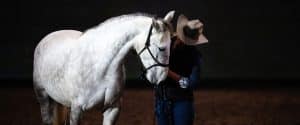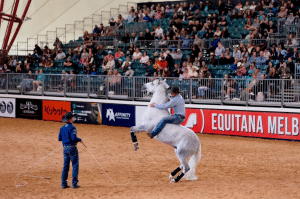I get a lot of questions on trailer/float loading and traveling my horses so I thought I would share my answer to a recent one based on my personal experience of traveling horses for thousands of kilometers over the past 20 years. I hope you find it useful…
Student: “How do you prepare your horses for a long trip?”
Russell: “Short trips…..”
Student: “Oh….?” (they were a New Zealander, everything sounds like a question).
The preparation: If your horse doesn’t handle short trips well then long trips are going to be worse. It’s like anything with horses, we start small and build up. For me the first part is getting to where they load well, I know that’s subjective, so this is what I mean by “load well”; you allow him to go on the trailer/float/truck. The wording’s important, it means he wants to go on, on his own with you still standing outside the trailer. There are a lot of things that can put horses off entering the trailer and I want to see a willingness to go on not reluctance. If I have reluctance I work on that until I have willingness. Can you load your horse from distance? Can you sit on the fender of the trailer and load him? Can you load him at liberty?
Some horses get better with repetition and long journeys, but most don’t. If you’re starting from a positive point it can get better, if you’re starting from a negative point it can get worse very quickly, this is why I put a lot of emphasis on “how” they load, far more than “if” they load.
I’ve twice had wheels sheer off and leave the trailer, had two trailer tyres blow out, one vehicle engine fire and one trailer fire. These are things that I hadn’t planned on, but I had prepared for. What followed each incident wasn’t ideal, but the horses coped with it because of the level I was prepared to go to to prepare them.
Horses don’t transfer learning very well so I would recommend that in preparation you load your horse in five different places around your own property, this can include turning your trailer 180 degrees to face the other way. Also, if you have the opportunity then get your horse used to loading in all weather conditions. It’s very common for people to get their horses to a venue and then have trouble loading them to take them back. You want to avoid that issue through preparation rather than luck.
The journey: Travelling in a trailer is physically fatiguing for a horse. I read some research on the subject and it concluded that the fatigue a horse experiences from traveling is the equivalent of him walking the same distance, or was it for the same time? Anyway, it’s fatiguing. From my own experience I believe that the fatigue factor is largely influenced by the variables i.e. type of trailer, direction they face related to travel, suspension, the vehicle they are being towed by, the road conditions, traffic conditions, how relaxed the are, weather conditions and most importantly…. how you drive!
I choose to stop every two hours for at least 10 minutes so they can rest, and be offered water and food. I know from past experiences that sometimes circumstances prevail over your good planning and a 3 hour trip can become a 7 hour trip where for a large part of that time you can’t offer water, food or rest so I don’t feel that it’s a waste to make those stops regularly, rather than just pushing on, not knowing what the future may hold for them.
I don’t like to have my horses inside the trailer for more than four hours so I will find somewhere to stop and let them off to stretch their legs, graze, pee and drink. This is where all the loading preparation is essential, it means you can unload them and load them up again regardless of where they are. I want to offer my horses the best possible deal and as you can see the preparation leads to the best possible deal.
Your horse is far more likely to suffer from overheating than from being too cold. The sheer effort of standing while traveling will raise his temperature so make sure there is really good ventilation in your trailer.
Checks: another big factor to consider is the condition of your trailer and towing vehicle. Check for bird’s nests, damaged wiring (thanks rats), and that the brakes are working properly – it’s common for brakes that haven’t been used for a long time to not engage or not release properly. Check the tyres and that all lights work on the trailer before you need them to, and give yourself the time to get repairs done if necessary.
Driving: One big tip I can give you is whenever turning make sure that the trailer is lined up directly behind you before you accelerate or you will throw the trailer from side to side and that small movement you see the trailer doing is exaggerated for the horse inside making it hard for him to keep his balance. Other than that … don’t be a jerk. Any upward are downward transitions you do while driving should be smooth. Neither you nor your passengers should rock back when you accelerate or be thrown forwards when you change gears, or brake for that matter. Think smooth and graceful transitions.
Happy Travels.


